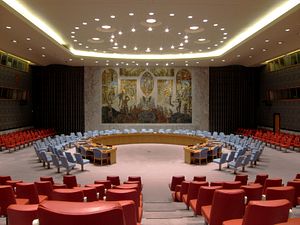What do Brazil, Germany, India, and Japan have in common? Though geographically disparate, each of these states seeks permanent membership on the United Nations Security Council and has the economic and political heft to make its bid not entirely unrealistic. Additionally, each member of this so-called G4 group of states supports each other’s bid for a permanent seat on the Security Council. This week, on the sidelines of the 70th United Nations General Assembly, Indian Prime Minister Narendra Modi will convene the group for the first time in more than ten years at the Waldorf-Astoria Hotel in New York City. German Chancellor Angela Merkel, Japanese Prime Minister Shinzo Abe, and Brazilian President Dilma Rousseff will be in attendance.
Security Council reform has been a tricky topic for the United Nations. Though most member states agree that the UNSC is anachronistic in its representation, to a degree, there is no consensus about how to proceed with adding new members. Each of the members of the G4 have a wide range of support, with a few notable exceptions. For example, India’s permanent seat bid is opposed by Pakistan and China has appeared lukewarm to the idea at best. Japan’s bid is opposed by China. Germany’s bid encounters some opposition from within the European Union itself, where member states have argued for common EU representation on the UNSC. Brazil’s bid, while it would grant Latin America representation at the UNSC, faces opposition from its neighbors, who don’t trust Brasilia to represent the best interests of the entire region.
Indeed, the G4 has an unofficial coalition of states who in the mid-1990s came together to found what came to be known as the “Coffee Club.” This “club,” also known as “Uniting for Consensus” comprised a group of states who opposed the expansion of the Security Council to include any or all of the G4 members. The group comprises 13 core members, including Italy, Pakistan, South Korea, Spain, Mexico, Argentina, Turkey, Canada and Malta.
So why are the G4 back together this week in New York City? Precisely because they want the overall UN agenda to take Security Council reform seriously. A General Assembly resolution passed earlier this month adopted a motion to begin text-based negotiations on UNSC reform, a reassuring sign for the G4. This appears to have been the event that spurred India to take the lead on bringing the G4 back together. New Delhi’s representative at the United Nations, Asoke Mukerji, noted that the decision to have Modi host the other three leaders during the General Assembly came after the September 14 resolution.
In Mukerji’s words, the G4 summit will send a message that these four states “can play a role in galvanizing broad based support for the outcome of the negotiations which will start in November this year.” “We regard this very substantive and very significant especially in the light of the fact that the UNGA recently passed a decision calling for text-based negotiations and presenting a text on the basis of which the negotiations on the Inter-governmental format can take place,” he added.
Security Council reform hasn’t been easy and still faces a range of obstacles. Though simply convening the G4 won’t do anything to pave a smooth path forward for the rest of the United Nations, it’s one more opportunity for the G4 to reiterate their common goal of permanent membership on the world’s apex multilateral decision-making body.
































